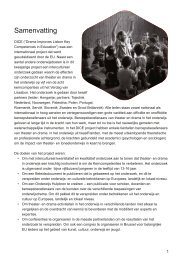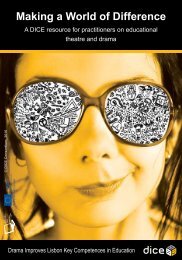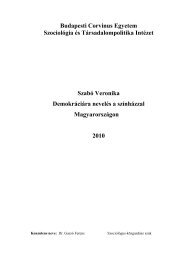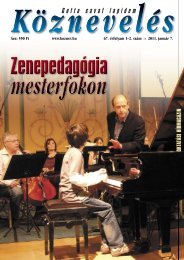Policy Paper - Drama Improves Lisbon Key Competences in Education
Policy Paper - Drama Improves Lisbon Key Competences in Education
Policy Paper - Drama Improves Lisbon Key Competences in Education
Create successful ePaper yourself
Turn your PDF publications into a flip-book with our unique Google optimized e-Paper software.
In contrast, however, <strong>in</strong> many countries educational theatre and drama<br />
• has low fund<strong>in</strong>g and/or status,<br />
• does not have a place <strong>in</strong> the national curriculum and/or the tertiary education<br />
system.<br />
Recommendations<br />
Therefore, we hereby call on all responsible decision makers, from school directors to<br />
the Commissioner of the European Union, to recognise the significance of educational<br />
theatre and drama. We have the follow<strong>in</strong>g ma<strong>in</strong> recommendations:<br />
• The school system: All children should have regular access to educational theatre<br />
and drama <strong>in</strong> their school<strong>in</strong>g, mandated throughout the national curriculum, and<br />
taught by well-tra<strong>in</strong>ed theatre and drama specialists.<br />
• Tertiary education: All teachers work<strong>in</strong>g <strong>in</strong> European schools should have a basic<br />
knowledge of what educational theatre and drama is and how the subject areas can<br />
contribute to the enhancement of teach<strong>in</strong>g and learn<strong>in</strong>g. <strong>Education</strong>al theatre and<br />
drama should be offered as <strong>in</strong>-depth studies <strong>in</strong> tertiary <strong>in</strong>stitutions <strong>in</strong> all European<br />
countries. It is very important to emphasise that theatre and drama cannot be taught<br />
without proper tra<strong>in</strong><strong>in</strong>g.<br />
• Partner organisations: To establish a strong network of organisations dedicated to<br />
educational theatre and drama, regardless of whether these are private or public.<br />
• National authorities (m<strong>in</strong>istries) and local / regional authorities: To develop a<br />
conscious strategy on the application of educational theatre and drama. To support<br />
the expansion and improvement of educational theatre and drama by legal and<br />
f<strong>in</strong>ancial means.<br />
• Institutions of the European Union: To consider the importance of all key<br />
competences <strong>in</strong> its strategies and communications,<br />
to provide adequate fund<strong>in</strong>g for <strong>in</strong>ternational<br />
educational theatre and drama projects,<br />
to take part <strong>in</strong> active recognition of<br />
the area. A long term strategy at the<br />
European level is needed to support<br />
educational theatre and drama. There<br />
should be a clear message <strong>in</strong> the<br />
form of an EC Communication or an<br />
EP Statement that all the above listed<br />
recommendations are encouraged at<br />
national level.<br />
Preface<br />
The follow<strong>in</strong>g chart shows how the attitude of some five thousand young people changed<br />
towards the least accepted nationality / m<strong>in</strong>ority <strong>in</strong> their country, <strong>in</strong> a duration of three<br />
months, on a scale of five where one means complete hatred and five means complete<br />
acceptance. As you can see, there is a remarkable difference between how the two<br />
groups of young people have changed dur<strong>in</strong>g these three months.<br />
average score on a scale of 1-5<br />
3.25<br />
3.00<br />
2.75<br />
2.50<br />
2.25<br />
<strong>in</strong>put<br />
control<br />
research<br />
output<br />
Chart 1. Differences between two<br />
groups of students <strong>in</strong><br />
their attitudes towards their<br />
country’s least accepted<br />
nationality / m<strong>in</strong>ority<br />
The young people were selected from twelve different countries. There were equal<br />
numbers of boys and girls, some were well-off and others were liv<strong>in</strong>g far below the<br />
poverty l<strong>in</strong>e, some were study<strong>in</strong>g <strong>in</strong> elite schools of the capital of an EU12 country,<br />
others were refugees <strong>in</strong> the most disadvantaged village of the Gaza strip.<br />
The only difference among them was that about half of the children attended educational<br />
theatre and drama programmes for three-four months (their scores are marked with<br />
---), while others did not (their scores are marked with ---- ). As you will see, children<br />
participat<strong>in</strong>g <strong>in</strong> educational theatre and drama activities changed <strong>in</strong> a significant way <strong>in</strong><br />
many other respects as well.<br />
<strong>Education</strong>al theatre and drama practitioners and theoreticians have believed <strong>in</strong> the<br />
efficacy of theatre and drama work for a long time, on the basis of see<strong>in</strong>g children’s<br />
responses <strong>in</strong> practice, but until now it has rarely been measured with quantitative<br />
scientific tools. In the DICE project, several dozen educational theatre and drama<br />
experts from twelve countries with the widest theoretical and professional background<br />
8 9







